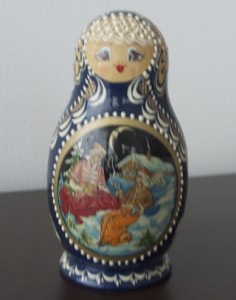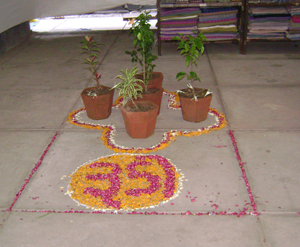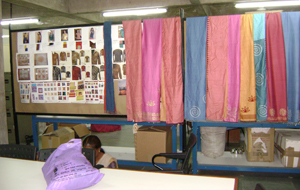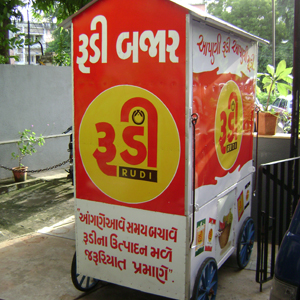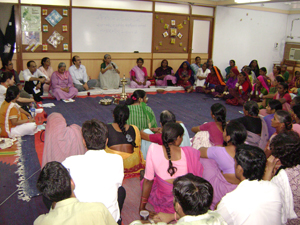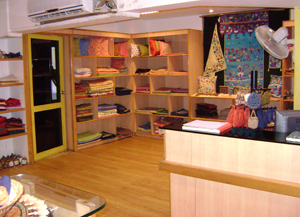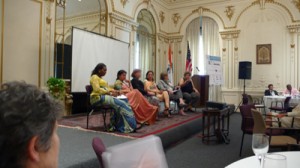
Luncheon Speakers at the Indian Consulate in New York
A recent article in the New York Times reminds me to share three of the lessons I learned during exchanges with women entrepreneurs from India. The second annual International Women’s Entrepreneurial Challenge (IWEC) was held last June here in New York. The competition celebrates outstanding female-led small businesses that are expanding on a global basis. Mine was one of the three women-owned small businesses selected to represent the U.S. in the IWEC program. Three women-owned small businesses were selected from each of the other participating regions: Spain (Barcelona), India and Africa. We had three very full days together, including a case study taught by IESE Business School (Barcelona) Professor Paddy Miller and a luncheon at the Indian Consulate in New York. The photograph shows the panel of our luncheon speakers, including Ambassador Ruth Davis of the U.S. State Department. Our hostess, Ambassador Neelam Dao, Consul General of India in New York, was an excellent speaker and unusually candid for a diplomat. She remarked about the embarrassment of Wall Street titans having to go to sovereign wealth funds of “third world countries” (remember this was in June of 2008, before the collapse of Lehman Brothers) for bailouts after they had enriched themselves while mismanaging their institutions. She added that in finance it is usually “last in, first out” and worried about the fate of smaller women-owned enterprises and microfinance clients who would, she correctly predicted, be unable to access financing to continue to grow their businesses, notwithstanding the fact that their businesses, our businesses, are sustainable and provide broad benefits to the world economy. I could not have agreed with her more and was delighted with her frankness.
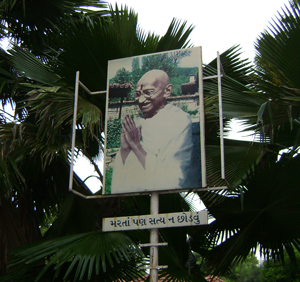
Gandhi's Ashram in Ahmadabad, India
I was even more delighted to read the report in the New York Times of the operations of SEWA, the Self-Employed Women’s Association. I had the occasion to visit SEWA in Ahmadabad, India, when I served as the Senior Policy Advisor to a program of the United Nations Capital Development Fund. SEWA is a network of more than 100 Gandhian-style, women-owned and led cooperatives, which do everything from offer childcare to sell produce to Indian agribusinesses for processing. (Gandhi’s ashram is also located in Ahmadabad.) Like more than 90% of Indians, SEWA members are employed in the informal economy, where most earn less than twenty cents a day and have no social safety net. They are vulnerable to what economists call “external shocks”, an antiseptic term for life’s calamities, such as illness or unemployment, for which they have no protection.
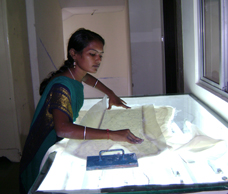
Printing a Pattern to Embroider
SEWA’s microfinance institution extends to credit to allow women in the slums to build small businesses, such as hair salons. It also offers retirement accounts and health insurance to the SEWA members to give them some protection against the unexpected, job training to enter non-traditional fields (such as women gas station attendants) and distribution of the handcrafted products of SEWA members to major retailers.
Pride in SEWA is shown in the flower petals arranged in the form of the SEWA logo and colors to welcome visitors. SEWA’s Trade Facilitation Centre supports two for-profit businesses that develop and sell traditional needlework products, an art passed from mother to daughter in the state of Guarat in India. SEWA develops designs that their marketing research show appeal to consumer tastes and then distribute these design imprints with individually packaged needle kits, containing all necessary supplies, to participating SEWA members. The members do the needlework in their homes, while tending to their small plots of land, caring for their children or elderly parents or raising a few small animals for feed.
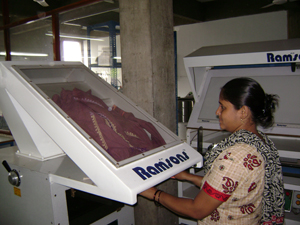
Cleaning and Drying
The finished products are brought to the SEWA Trade Facilitation Centre for processing, where they are spun dry, to remove any dust or particles they may have acquired, and properly cleaned. They are then sent to SEWA retail shops in New Delhi and Ahmadabad for sale to consumers. SEWA hopes to have an e-commerce site available in the near future.




